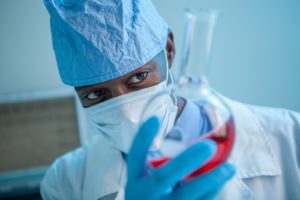
When confronted with testicular trauma or infections, reviewing the treatment options is essential for addressing all consequences, including low sperm count. Here is a comprehensive overview of the various treatment modalities available, shedding light on how they can help restore reproductive health.
Treatment for Testicular Trauma and Infections
Medical treatment constitutes the cornerstone of addressing testicular trauma and infections. The choice of treatment primarily depends on the nature and severity of the condition. For testicular infections, such as epididymitis or orchitis, antibiotics are typically prescribed. These medications target the underlying infection, helping to alleviate pain and inflammation while preventing further complications. It’s worth noting that prompt treatment of infections is essential to prevent their spread and potential impact on sperm production.
In cases of testicular trauma, especially those involving fractures or severe contusions, surgical intervention may be necessary. Surgery aims to repair damaged tissues and structures within the testicles, facilitating their proper function. While surgical procedures may sound daunting, advances in medical technology have made them safer and more effective than ever before.
Source: Testicular Trauma
Lifestyle Modifications for Recovery
In addition to medical interventions, adopting certain lifestyle modifications can significantly aid in the recovery process. A balanced diet rich in essential nutrients, especially antioxidants like vitamin C and E, can help combat inflammation and oxidative stress within the testicles. Regular exercise promotes overall well-being and can contribute to improved blood circulation, which is vital for the testicles’ health.
Stress management is another critical aspect of lifestyle modification. High-stress levels can negatively impact reproductive health by disrupting hormonal balance. Techniques such as mindfulness meditation, yoga, and deep breathing exercises can help individuals manage stress effectively.
Alternative and Complementary Therapies
While medical treatment and lifestyle modifications are standard approaches, some individuals explore alternative and complementary therapies to augment their healing journey. These therapies may include acupuncture, herbal remedies, and holistic treatments. While research on their efficacy is ongoing, some individuals report positive results in terms of pain relief and improved reproductive function.
Monitoring Progress and Seeking Expert Guidance
Throughout the treatment process, it’s essential to monitor progress closely. Regular follow-up appointments with healthcare professionals can help track improvements and make necessary adjustments to the treatment plan. If low sperm count persists or worsens despite initial treatments, seeking the expertise of a fertility specialist is advisable. These specialists can offer advanced diagnostic tests and treatments tailored to individual needs.
Each of these avenues plays a crucial role in restoring reproductive health and, ultimately, improving sperm count for individuals facing these challenges.
Medical Treatment for Testicular Trauma and Infections
Medical treatment forms the backbone of managing testicular trauma and infections. In this section, I’ll review the specific medical interventions that healthcare professionals commonly prescribe to address these issues and how they contribute to the restoration of sperm count and overall reproductive health.
Antibiotics
For individuals experiencing testicular infections, such as epididymitis or orchitis, antibiotics are the primary line of defense. These medications are designed to combat bacterial infections that can cause pain, swelling, and discomfort in the testicles. The timely use of antibiotics is critical in preventing the infection from spreading to other parts of the reproductive system and exacerbating the problem.
When it comes to antibiotics, the choice depends on the type of bacteria causing the infection. Healthcare providers may conduct tests to identify the precise strain and its susceptibility to different antibiotics. Tailoring the treatment to the specific pathogen ensures a more targeted and effective approach.
Source: Bacterial infections
Surgical intervention
In cases involving testicular trauma, surgical intervention may be necessary, especially if there are severe injuries such as fractures or significant tissue damage. Surgical procedures aim to repair the damaged structures within the testicles and restore their normal function. While the idea of surgery can be daunting, advancements in medical technology and surgical techniques have made these procedures safer and more successful than ever before.
The decision to opt for surgery is typically based on a thorough evaluation by a healthcare professional who assesses the extent of the trauma and the potential impact on reproductive health. It’s essential to discuss the benefits and risks of surgery with your healthcare provider to make an informed decision about the most suitable course of action.
In both cases—testicular infections and trauma—the ultimate goal of medical treatment is to alleviate pain and discomfort, eliminate infection, and restore the normal functioning of the testicles. By addressing these issues, medical interventions play a crucial role in improving sperm count and quality.
Source: Treating Scrotal and Testicular Conditions
It’s important to note that medical treatment should be accompanied by appropriate follow-up care and monitoring to ensure the effectiveness of the chosen approach. Additionally, individuals undergoing treatment for testicular trauma or infections should communicate openly with their healthcare providers to address any concerns and track progress, ultimately working towards the goal of improved reproductive health and an enhanced sperm count.
Lifestyle Modifications for Recovery
Beyond medical treatments, adopting specific lifestyle modifications can significantly contribute to the recovery process from testicular trauma and infections. You should realize how simple yet impactful changes in one’s daily routine can aid in the restoration of reproductive health and the improvement of sperm count.
- A balanced diet is foundational to overall well-being, including reproductive health. For individuals recovering from testicular trauma or infections, paying attention to nutrition becomes crucial. Certain nutrients play a pivotal role in combating inflammation and oxidative stress within the testicles, both of which can impact sperm production.
- Antioxidants, such as vitamin C and E, are known to have anti-inflammatory properties and can help protect sperm from damage caused by free radicals. Including foods rich in these antioxidants, such as citrus fruits, berries, nuts, and seeds, can be beneficial.
- Omega-3 fatty acids, found in fatty fish like salmon and flaxseeds, also have anti-inflammatory properties and may help reduce inflammation in the reproductive system.
- Zinc, an essential mineral, plays a role in sperm production and testosterone metabolism. Foods like lean meats, nuts, and whole grains are good sources of zinc.
- Regular exercise is another critical aspect of promoting recovery. Exercise not only improves overall cardiovascular health but also enhances blood circulation throughout the body, including the reproductive organs. Improved blood flow can contribute to better healing and overall testicular health.
- Stress management is equally important. High-stress levels can disrupt hormonal balance, potentially affecting sperm production. Techniques such as mindfulness meditation, yoga, and deep breathing exercises can help individuals manage stress effectively.
- Adequate sleep is often underestimated but is vital for overall health and recovery. During deep sleep, the body undergoes repair and regeneration, including the testicles. Ensuring a consistent and sufficient sleep schedule is crucial.
- Hydration should not be overlooked. Proper hydration supports bodily functions, including the production and transport of sperm. Staying well-hydrated can help maintain optimal reproductive health.
Incorporating these lifestyle modifications into one’s daily routine can complement medical treatments for testicular trauma and infections. While they may not serve as standalone solutions, they play a valuable role in supporting the healing process and improving sperm count.
Source: Management of Testicular Trauma
It’s important to consult with healthcare professionals to ensure that lifestyle changes align with the individual’s specific condition and treatment plan. By making these adjustments, individuals can actively participate in their recovery journey and work towards the goal of enhanced reproductive health and an improved sperm count.
Alternative and Complementary Therapies
In addition to conventional medical treatments and lifestyle modifications, some individuals seek alternative and complementary therapies to enhance their recovery from testicular trauma and infections. While these approaches may not replace standard medical care, they can offer additional support and potential benefits. There are many alternative and complementary therapies that individuals may consider and their potential impact on reproductive health and sperm count.
- Acupuncture: Acupuncture is a traditional Chinese therapy that involves the insertion of thin needles into specific points on the body. Some individuals find acupuncture sessions to be relaxing and helpful in reducing pain and inflammation associated with testicular trauma or infections. While more research is needed to establish its effectiveness, acupuncture may be a complementary therapy worth exploring.
- Herbal Remedies: Herbal remedies have been used for centuries in various cultures to address a wide range of health issues. Some herbs are believed to have anti-inflammatory or immune-boosting properties that could potentially aid in the healing process. It’s important to consult with a qualified herbalist or healthcare provider before using herbal remedies to ensure safety and efficacy.
- Holistic Approaches: Holistic therapies encompass a broad range of practices that consider the individual as a whole—mind, body, and spirit. Techniques such as holistic nutrition, chiropractic care, and mindfulness-based stress reduction may be incorporated into a comprehensive healing plan. These approaches aim to support overall well-being, which can positively impact reproductive health.
- Nutritional Supplements: Certain supplements, such as antioxidants, zinc, and omega-3 fatty acids, may be recommended by healthcare providers as part of a holistic approach to recovery. These supplements are chosen based on their potential to reduce inflammation, support tissue repair, and enhance sperm production.
It’s important to approach alternative and complementary therapies with caution and under the guidance of qualified healthcare professionals. While some individuals report positive experiences with these therapies, their effectiveness can vary from person to person, and scientific evidence may be limited.
Moreover, these therapies should never replace prescribed medical treatments for testicular trauma or infections. Instead, they can complement standard care and help address specific aspects of the healing process.
Source: Sexually Transmitted Infections Treatment Guidelines
Individuals interested in exploring alternative and complementary therapies should engage in open communication with their healthcare providers to ensure that these approaches align with their overall treatment plan and contribute positively to the goal of improving reproductive health and sperm count.
Monitoring Progress and Seeking Expert Guidance
Throughout the journey of recovering from testicular trauma and infections, it’s crucial to maintain a vigilant approach by closely monitoring progress and seeking expert guidance. Don’t underestimate the importance of regular check-ups and plan when to consider consulting with a fertility specialist, ensuring that individuals receive the most appropriate care to enhance reproductive health and sperm count.
- Regular Follow-Up Appointments: After initiating medical treatment or implementing lifestyle modifications, individuals should adhere to their healthcare provider’s recommended schedule for follow-up appointments. These visits serve multiple purposes: they allow healthcare professionals to assess the progress of recovery, monitor the effectiveness of the chosen treatment plan, and make necessary adjustments if required.
- Communicate Openly with Healthcare Providers: Effective communication with healthcare providers is essential. Individuals should feel comfortable discussing any concerns or changes in their condition during follow-up appointments. Sharing information about pain levels, side effects of medications, or lifestyle adjustments can help healthcare providers tailor treatment plans to individual needs.
- Assessing Treatment Effectiveness: Healthcare providers will assess the effectiveness of treatment based on several factors, including the resolution of symptoms, reduction in inflammation, and improvements in sperm count and quality. Tracking these indicators provides valuable insights into the success of the chosen interventions.
- Seeking Expert Consultation: If low sperm count persists or worsens despite initial treatments, it may be prudent to seek the expertise of a fertility specialist. Fertility specialists are highly trained in diagnosing and treating reproductive health issues, and they can offer advanced diagnostic tests and specialized treatments tailored to individual circumstances.
- Advanced Fertility Interventions: In cases where testicular trauma or infections have led to severe and persistent fertility challenges, advanced fertility interventions such as in vitro fertilization (IVF) or intracytoplasmic sperm injection (ICSI) may be considered. These procedures involve the direct handling and manipulation of sperm to facilitate fertilization and can be effective in achieving pregnancy when other methods have not been successful.
- Emotional Support: Dealing with reproductive health challenges can be emotionally taxing. Seeking emotional support, whether through counseling, support groups, or confiding in trusted friends and family, can be invaluable in maintaining mental well-being throughout the recovery process.
Monitoring progress and seeking expert guidance are essential components of the journey towards improving reproductive health and sperm count after testicular trauma or infections. By adhering to regular follow-up appointments, maintaining open communication with healthcare providers, and considering expert consultation when necessary, individuals can optimize their chances of achieving their desired reproductive outcomes.
Whether through conservative treatments or advanced interventions, the ultimate goal remains the same: restoring reproductive health and the potential for parenthood.
Source: Sexual and Reproductive Health
Restoring Reproductive Health Through Treatment
The journey of overcoming testicular trauma and infections is one marked by resilience, determination, and a commitment to regaining reproductive health. While the challenges posed by these conditions are undeniable, the positive effects of treatment can be both transformative and life-changing. In this conclusion, we celebrate the triumphs of individuals who have embarked on this path, highlighting the profound impact that treatment can have on sperm production, sperm count, and overall sperm health.
Treatment for testicular trauma and infections is not just about addressing immediate symptoms – it’s about reclaiming the potential for parenthood and fostering a brighter reproductive future. As we reflect on the journey, it becomes evident that treatment serves as a beacon of hope, offering a multitude of benefits:
- Improved Sperm Production: One of the most promising outcomes of treatment is the restoration of normal sperm production. Medical interventions, lifestyle modifications, and complementary therapies work in synergy to rejuvenate the testicles, allowing them to resume their essential role in sperm generation. This revitalization often leads to increased sperm production.
- Elevated Sperm Count: A key measure of reproductive health, sperm count, sees marked improvements with the right treatment regimen. Medical treatments effectively combat infections, reducing inflammation and damage to the reproductive system. Lifestyle modifications and holistic approaches further support the healing process, resulting in a notable increase in sperm count.
- Enhanced Sperm Quality: Beyond quantity, the quality of sperm is a crucial factor in achieving fertility. Treatment helps mitigate factors that can compromise sperm quality, such as oxidative stress and hormonal imbalances. As a result, sperm become healthier, more motile, and better equipped for fertilization.
- Restored Fertility: Perhaps the most cherished outcome is the restoration of fertility. For individuals and couples who have faced the uncertainty of infertility due to testicular trauma or infections, successful treatment can be life-altering. It opens the door to the possibility of natural conception and the realization of parenthood dreams.
- Emotional Well-Being: Alongside the physical improvements, the emotional well-being of individuals and couples is profoundly impacted. Successfully navigating the challenges of testicular trauma and infections, and witnessing the positive results of treatment, brings a renewed sense of hope and optimism.
The path from testicular trauma and infections to treatment and recovery is a testament to the strength of the human spirit. It is a journey marked by hope, resilience, and the unwavering pursuit of a brighter reproductive future.
Through medical treatments, lifestyle modifications, complementary therapies, and the expertise of fertility specialists, individuals can regain control of their reproductive health and experience the joy of improved sperm production, increased sperm count, and overall enhanced sperm health!


